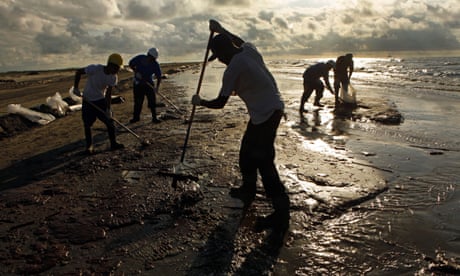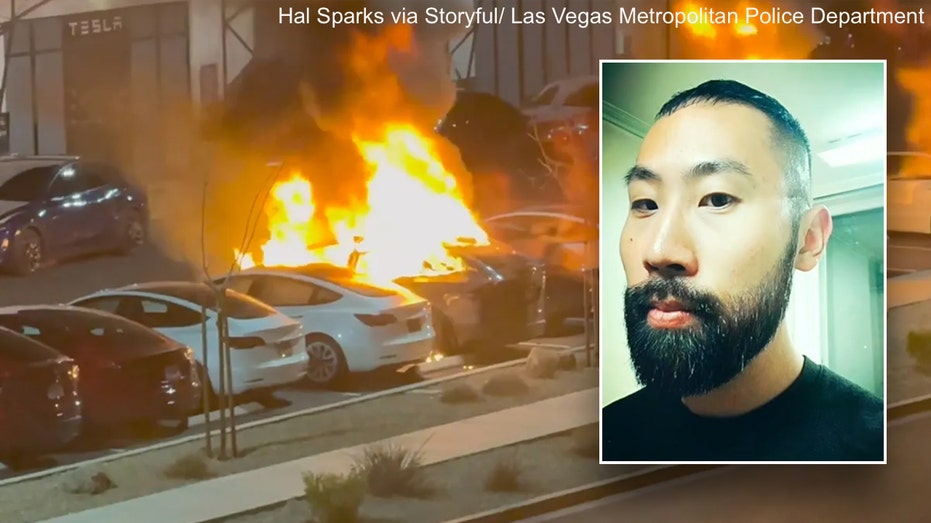- by foxnews
- 28 Mar 2025
Key findings from our investigation into the people who got sick after cleaning up BP’s oil spill
Key findings from our investigation into the people who got sick after cleaning up BP’s oil spill
- by theguardian
- 24 Apr 2023
- in news

Thousands of people have sued BP for long-term health conditions they claim stem from the dirty work of cleaning up BP's Deepwater Horizon oil spill 13 years ago. The explosion marked the biggest industrial disaster in US history, which saw thousands of Gulf coast residents, many from poor fishing communities, take part in the clean-up effort.
The Guardian spoke with two dozen former workers, used computer programming to analyze a random sample of cases and combed through legal filings to understand the scope of the public health disaster.
BP declined to comment on detailed questions, citing ongoing litigation.
Here are some key findings:
Among those who are sick there is a shared feeling of exasperation and anger as the chances of receiving damages and acknowledgement via the courts rapidly dwindles. They boated out into the Gulf to try to block the oil from coming ashore with floating barriers, called booms. They worked 12-hour shifts in the middle of the summer to save the wetlands and say they got sick as a result.
The Guardian used computer programming to analyze a random sample of 400 lawsuits out of the nearly 5,000 filed against BP. Many of the people in our sample have more than one ailment. Sinus issues are the most common chronic health problem listed among those who have sued, followed by eye, skin and respiratory ailments. Chronic rhinosinusitis, a swelling of the sinuses in the nose and head that causes nasal drip and pain in the face, was the most common condition. Two per cent have been diagnosed with cancer, a number some experts believe will continue to rise.
Federal agencies encouraged BP to take urine, blood or skin swab samples of cleanup workers to detect whether toxins had entered their bloodstream. Instead, the fossil fuel firm depended on air monitoring to determine if workers were safe. Internal emails, gleaned from discovery in the lawsuits and reported on for the first time by the Guardian, show that was not BP's only goal.
In a chain of emails among BP's occupational hygiene team from 31 July 2010, the company discussed why it was continuing its air monitoring efforts. "Although we are documenting zero exposures in most monitoring efforts, the monitoring itself adds value in the eyes of public perception, and zeros add value in defending potential litigation," wrote John Fink, a BP industrial hygienist.
Lawyers say this shows BP was already preparing its legal defense in the immediate aftermath of the spill.
The fossil fuel firm has deposed some plaintiffs and their doctors for hours, combing over their medical records, tax returns and employment files. In court, BP has argued that without biological evidence, workers and coastal residents cannot prove their illnesses were caused by the oil spill, despite research linking exposure to the spill with an increased risk of cancer and higher rates of long-term respiratory conditions, heart disease and other conditions . Thousands of cases have been dismissed, according to plaintiff lawyers. Only one known case has resulted in settlement: the case of Capt John Maas.
Maas helped rescue oiled birds and turtles during the spill, and later developed chemically induced asthma and restrictive lung disease. He was deposed twice by BP, totaling more than 15 hours of questioning, he recalled. BP also deposed his doctor, Charles Wray, prodding him to say that Maas's asthma was actually caused by his obesity, not the oil spill. But, according to transcripts, Wray was unswayed and the company ultimately settled the suit.
Documents suggest that not much was done by BP to prepare cleanup workers for the toxic risks associated with the job. Recently released BP training modules, obtained in discovery by the Downs Law Group, a law firm filing claims against BP, have led the firm to argue that cleanup workers received minimal briefing on toxic hazards.
In one module, prepared for shoreline workers, the risk of exposure to dispersant is characterized as "very unlikely", adding that the "health effects would be similar to exposure to any mild detergent".
Within a month of the Deepwater Horizon rig explosion, BP began running an aggressive and expansive local PR campaign, placing full page advertisements in local newspapers around the Gulf coast over the next year. The company's army of local cleanup workers were placed front and center.
The campaign ran under the banner: "We will make this right."
Over a decade later, the phrase would be repeated almost verbatim as the slogan to another campaign promoting the corporate response to the toxic disaster in East Palestine, Ohio.
In addition to trying to control the public narrative, BP put researchers on its payroll and had a role in reviewing certain scientific research about the impacts of the spill. The Downs Law Group uncovered an internal BP spreadsheet in discovery that appears to track the company's review process in the publication of 29 scientific studies on a variety of topics, including the spill's toxicity and impacts on birds, fish and oysters.
Samuel Castleberry, 59, was diagnosed with prostate cancer that has now spread to his liver. He has endured 18 rounds of chemotherapy already.
John Pabst was diagnosed with lymphoma in his eye and said he developed PTSD after the treatment.
James "Catfish" Miller was hospitalized multiple times in the immediate aftermath of the spill. "I think we've just been robbed of our health in our life," he said.
The valor displayed by cleanup workers was comparable to the heroism of first responders during the 9/11 terror attacks, who ran to the World Trade Center to save people and breathed in toxic dust and fumes, said the Alaska toxicologist Riki Ott, who became involved in advocating for oil spill cleanup workers after the 1989 Exxon Valdez spill in Alaska.
"What resident and professional oil spill responders do is exactly what professional firefighters and emergency responders everywhere do: put their lives on the line to protect ours," she said.
- by foxnews
- descember 09, 2016
Flight passenger says traveler sent $150 over Venmo in swap for aisle seat
A flight passenger says a fellow traveler who wanted to sit next to his friend paid $150 through Venmo to switch a middle seat for an aisle seat. Social media users joined the debate.
read more


